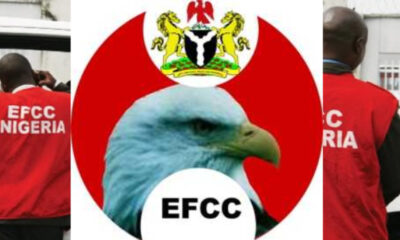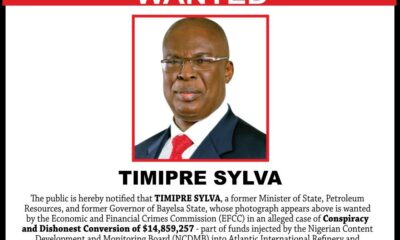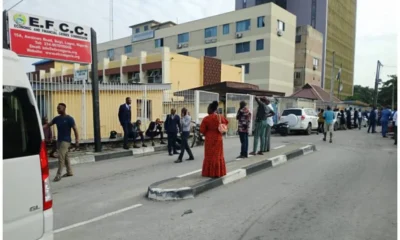News
Two Senior Lawyers Threaten Legal Action, Demand EFCC Scrap

Olisa Agbakoba (SAN), a former president of the Nigerian Bar Association, asserted that the Economic and Financial Crimes Commission (EFCC) should not have been and that it now works in violation of the Constitution.
According to Agbakoba, the EFCC lacks the authority to impede state governments’ operations because it was established by the National Assembly.
READ ALSO: Video: Concerned Woman Raises Alarm Over RRS Team, BRT Buying Fuel From Fuel Stations
The lawyer, who made this claim on Thursday during a news conference in Lagos, insisted that the 1999 Constitution only allowed for one police force to exist in Nigeria, and that the anti-graft agency was not a division of the police and hence was unable to carry out its duties.
He emphasized that Section 4 of the 1999 Constitution divides the powers of government into two: the federal and the state, and that the EFCC is a federal organisation founded by the National Assembly.
He said, “The question would be if the EFCC is created by the Federal Government, can it then prosecute state offences?
“The Supreme Court in many of its decisions has held that federalism means two autonomous and independent governments and if that is correct, the EFCC does not have the right to go to the states and examine their accounts.
“Anybody can read section 46 of the EFCC Act and Section 36(12) of the 1999 Constitution. Section 36(12) states that all offences must be defined and specified when you now read Section 46, you ask yourself if it complies with Section 36(12). It doesn’t.
“I have asked myself in my research, is the EFCC a police force, is it an intelligence agency or is it a security agency? I have looked at the definition of what the Police Force might be. The police force is that which investigates and detects crimes stops crimes and sometimes prosecutes. That is the core function of the police force.”
Agbakoba argued that because the EFCC is carrying out police duties and Section 214 of the Constitution specifies that there shall be only one police force, “then one of my prayers in court would be that EFCC ought not to exist in the first place because it is not a branch of the police and that the job done by the EFCC is the same one being done by the Police’s Special Fraud Unit.
“My other prayer would be whether the National Assembly can make laws for the federation and to what extent can the National Assembly which is an arm of the Federal Government make laws authorising a federal agency to exercise powers as if it were a state agency.”
Agbakoba went on to say that although he is one of the most ardent defenders of the rule of law and the battle against corruption, he is not opposing the commission and that the true problem is the security agencies’ disregard for the law.
In an interview with The Punch, another senior advocate, Mr Ebun Adegboruwa, backed Agbakoba on the issue.
Adegboruwa said, “All the people in the EFCC who are working are regular policemen who were drafted from the existing police force. So it is a matter of training and empowerment.
“If the facilities, money and training available to the EFCC are available to the police, I am sure probably they will do better. So I have reasons to believe and agree with Dr Agbakoba that too many agencies of government are being duplicated.”
Norrison Quakers (SAN), in contrast, dissented with them and asserted that the EFCC is unique from the police since the law that founded it gave it the authority to look into and punish financial offences.
Similarly, Agbakoba and Adegboruwa were criticized by Mr. Wahab Shittu (SAN).
He said that the Independent Corrupt Practices and Other Related Offences Commission and the Economic and Financial Crimes Commission were established particularly to combat corruption.



























